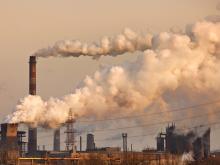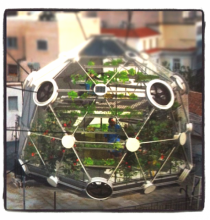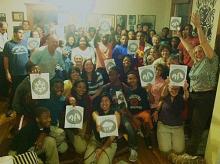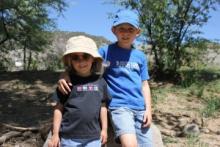Environmental Stewardship

Last night I had the rare privilege of dining with the president of my alma mater, Luther College, as he accepted a well-deserved Climate Leadership Award from Second Nature on the college’s behalf.
While I’d met President Richard Torgerson a couple of times before at alumni gatherings, I hadn’t had the opportunity to talk with him about the extensive sustainability efforts that the college has undergone during his tenure. And there have been a lot of such efforts to discuss. Nor had I been able to ask him about his experience as an entomologist. I was keen to find out if his love for bugs was inspired by a great professor, as mine was by Dr. Kirk Larsen in the biology department at Luther. It takes a special person, after all, to get others excited about God’s creepy crawly little creatures and to use that excitement to launch a lifelong commitment to environmental stewardship.

I spend most of my days studying the natural environment. From that perspective, the answer is clear: God has given us the freedom and the ability to make choices. These choices have consequences. And one of the consequences of building in fire-prone areas (and suppressing natural fire patterns in those same areas) is that when a fire comes, there is a lot to burn.
In most cases, these fires are the result of a perfect storm: lots of vegetation, low humidity, dry, hot and windy conditions, and a spark, usually from a human source. In a place where fire is common, like the western U.S., these conditions all come together naturally every few decades or so.
But fires are intimately related to temperature, humidity, and rainfall. So it makes sense to ask—is climate change making these fires worse? Do our energy choices, which include burning coal and gas and oil and increasing levels of heat-trapping gases in the atmosphere, affect the risk of wildfire?

In a full vote Wednesday morning the Senate rejected a measure intended to roll back the Environmental Protection Agency's implementation of the Mercury and Air Toxics Standards (MATS), a rule that would limit mercury emissions from coal-burning power plants.
As Sen. Lamar Alexander (R-Tenn.) said, “We don’t want to make the Great Smokies the Great Smogies.”
For the past four years, we have heard angry cries and even threats over the government bailouts for big banks, the auto industry and others during this economic downturn. Senators and representatives have lost their jobs over these bailouts. Yet Congress has been giving special breaks and what amounts to subsidies to the coal-fired utility industry for more than 20 years. It’s not taxpayer money but the health and life of our children that is being spent.
Writing for The Huffington Post, actor and environmental activist Robert Redford argues:
"Every year, around the world, almost one trillion dollars of subsidies is handed out to help the fossil fuel industry. Who came up with the crazy idea that the fossil fuel industry deserves our hard-earned money, no less in economic times of such harsh human consequence? We fire teachers, police and firemen in drastic budget cuts and yet, the fossil fuel industry can laugh all the way to the bank on our dime? Something doesn't add up here.
For Salon, Fred Pearce writes:
Saudi Arabians have grown colossally rich on the country’s oil reserves. They have grown used to the idea that petrodollars can buy them anything. But Saudis are waking up to the fact that all their wealth will count for nothing if they have nothing to eat. And — despite the conference tables heaving with French, Persian, American and Arab cuisine — that is a growing threat. “If we want our grandchildren to live as we are, we need to change now, or we will be like an African country in 50 years, asking for aid,” Adil Bushnak, a former member of the Saudi Supreme Economic Council, told me during a conference session I was chairing
Learn more here
Writing for The Huffington Post, Desmond Tutu, Archbishop Emeritus of Cape Town, a Nobel Peace Laureate and Chair of The Elders writes on why inter-generational dislogue is so important in tackling the big issues of the day:
For the sake of our planet, a conversation that needs to be heard is the one between generations, between elders and young people around the world -- and those who are in between.
For Talking Points Memo, Eric Lach reports on the 'progress' of the North Carolina bill that restricts state agencies’ ability to take global warming into account when making sea-level rise projections:
The language in the bill was toned down from the version that had been circulating — the original version of the bill stated starkly that rates of sea-level rise could use only historical data, extrapolated linearly, despite the fact that most scientists expect sea-levels to rise faster over the next century as a result of global warming — but the version of the bill approved Thursday still contains the following language:
[Rates of sea-level rise] shall be determined using statistically significant, peer-reviewed historical data generated using generally accepted scientific and statistical techniques. Historic rates of sea-level rise may be extrapolated to estimate future rates of rise but shall not include scenarios of accelerated rates of sea-level rise unless such rates are from statistically significant, peer-reviewed data and are consistent with historic trends.
Climate change experts and skeptics can hash it out all they want, but Victor Mughogho is living it.
His home country of Malawi is already feeling the effects of climate change in real and devastating ways. Five droughts in the past 20 years, coupled with changing weather patterns, have resulted in famine — and a generation of children growing up developmentally stunted because of malnourishment.

What is a climate orphan? Why is the term “fossil fuels” misleading? What do knives have to do with air pollution and valuing our children? How can addressing climate change be 100 percent compatible with Christian values? Why should we care?
These questions and many others were part of a national conference call on creation care and climate change recently hosted by Sojourners. A handful of our nation’s leading creation care voices came together to discuss how they answer tough questions and effectively communicate their faith and commitment to climate justice.
The speakers included:
Rev. Mitch Hescox, President & CEO of the Evangelical Environmental Network; contributor, Sacred Acts: How Churches are working together to Protect Earth’s Climate.
Rev. Sarah Scherschligt, Associate Pastor, Prince of Peace Lutheran Church, Gaithersburg, MD; author, http://thebarefootpastor.blogspot.com/; Founder and leader of the Creation Care Team for the Metropolitan Washington DC Synod of the Lutheran Church (ELCA).
Katharine Hayhoe, Director of Climate Science Center and Associate Professor at Texas Tech University; co-author, A Climate for Change: Global Warming Facts for Faith-Based Decisions.
Calvin B. DeWitt, Professor, Gaylord Nelson Institute for Environmental Studies, University of Wisconsin – Madison; author, Earthwise and Song of a Scientist: The Harmony of God-Soaked Creation
Listen to their presentations.
Bio: Pastor of Providence Missionary Baptist Church in Atlanta, Gerogia, providenceatlanta.org
1. How did you get involved in environmental justice?
About six years ago, Laura Seydel, Ted Turner’s daughter, invited me to see a movie, The Great Warming. At the time, the environment was the last thing on my mind. I was more concerned about HIV, cholesterol, diabetes, unfair jail sentences, disparity in drug sentencing—these kinds of things. But I went to see the film.
The next thing I knew I was talking to African-American pastors about something that was not on our screen: Earth Day. If we understand that God created a perfect earth and that we’re destroying it, then we have an obligation to enlighten our people about this and find out what we can do. And I had to tell the people in the old environmental community that this is not a campaign—it has to be a movement, similar to the civil rights movement. People must be involved, knowledgeable, aware.
2. Why have you used the word “conversion” to talk about your awakening to environmental needs?
I could not make the connections initially between my community and polar bears, so I began to read about it. Once I began to understand, I took it from 2 Chronicles 7:14: “If my people will humble themselves and seek my face, turn from their wicked ways, then I will hear from heaven and heal their land.” I saw the land as bigger than just the ground; I saw the land as being all of us, as one. If God can create a climate where animals and plants and human beings work together, we have a responsibility to try to maintain that balance. That’s when the “conversion” really hit me.
From The Associated Press:
The world's air has reached what scientists call a troubling new milestone for carbon dioxide, the main global warming pollutant. Monitoring stations across the Arctic this spring are measuring more than 400 parts per million of the heat-trapping gas in the atmosphere.
Learn more here

Editor's Note: The following is testimony delivered by Alycia Ashburn, Creation Care Campaign Director for Sojourners, to the Environmental Protection Agency's New Source Pollution Standards for Carbon Pollution Hearing on May 24 in Washington, D.C.
My presence and testimony here today – in support of the EPA’s New Source Standards for Carbon Pollution – is as much a religious and personal act as it is a professional one.
While I am here wearing my “work hat” – as director of the creation care campaign at Sojourners (one of the nation’s largest network of Christians committed to social justice) - I wear my many other hats at the same time: U.S. citizen, Christian, congregation member, educator/trainer for Lutherans Restoring Creation, biologist, wife, daughter, runner, National Parks lover, and last but certainly not least, especially in this context: asthma sufferer.
In an opinion piece for The Huffington Post, Sen. Bernie Sanders (I-VT) writes:
At a time when we have more than $15 trillion national debt, American taxpayers are set to give away over $110 billion dollars to the oil, gas, and coal industries over the next decade. Clearly, we cannot afford it. When the five largest oil companies made over $1 trillion in profits in the last decade, with some paying no federal income taxes for part of that time, they certainly do not need it.
Read his full article here
WOW! More than 3,000 of you submitted comments to the Environmental Protection Agency regarding their proposed carbon regulation. Thank you for your heartfelt letters and remarks in support of this rule -- read some of them below! Why are people supporting the EPA carbon rule? Faith, health, science, family, you name it. Below you’ll find some samples from Sojourners members.
While James Hansen's TED talk may be a few months old, his message continues to resonate as concerns around climate change grow worldwide.
The total energy imbalance now is about six-tenths of a watt per square meter. That may not sound like much, but when added up over the whole world, it's enormous. It's about 20 times greater than the rate of energy use by all of humanity. It's equivalent to exploding 400,000 Hiroshima atomic bombs per day 365 days per year. That's how much extra energy Earth is gaining each day. ~ James Hansen

According to our friends at Good.is, Buckminster Fuller'sgeodesic dome is making a comeback with urban farmers.
A new dome-based prototype promises an affordable method of rooftop aquaculture for apartment and commercial buildings—as the website calls it, getting "fish from the sky." The Globe / Hedron bamboo domewould house an aquaponics system—a mini-ecosystem in which plants clean the water where fish swim and fish waste fertilizes the plants—capable of feeding 16 people year-round. The unique structure of the dome, designed by Conceptual Devices, would support the weight of the fish tank, enabling installation on flat roofs without adapting the structure of the building. The design firm is partnering with Zurich-based group UrbanFarmers, which developed the aqauponic technology, and they're currently fundraising on indiegogo to get the project off the ground.
The Atlantic reports on 'The Coming Global Water Crisis':
"In the next twenty years, global demand for fresh water will vastly outstrip reliable supply in many parts of the world. Thanks to population growth and agricultural intensification, humanity is drawing more heavily than ever on shared river basins and underground aquifers. Meanwhile, global warming is projected to exacerbate shortages in already water-stressed regions, even as it accelerates the rapid melting of glaciers and snow cover upon which a billion people depend for their ultimate source of water."
Read more about the crisis here

Sacred the land,
Sacred the water,
Sacred the sky,
Holy and true,
Sacred all life,
Sacred each other,
All reflect God who is good.
– Franciscan Brother Rufino Zaragoza, OFM
Last Friday night was the first time I uttered this refrain. As I sang, I felt a sense of gratitude to know the significance of these words and to feel the conviction of knowing that I have a responsibility in protecting that which is sacred.

Amy’s mom, Suzie, and stepfather, Russ, live on a 12-acre apple orchard nestled against the Rio Grande in northern New Mexico. Instead of describing it, I decided to show it.
Enjoy.
Of the many gifts that the 99 percent award to the 1 percent—the various tax breaks and tributes that have helped push inequality in America to record levels—none are quite as annoying as the subsidies awarded the fossil fuel industry.
Vermont Sen. Bernie Sanders introduced a bill this spring that would trim $20 billion a year from those payouts to coal and oil and gas companies. Barack Obama, modest almost to a fault, has identified $5 billion in handouts that he’d like taken away before this year’s budget is finalized. Whatever the number, the principle is crucial. Because if we can’t agree not to subsidize the fossil fuel industry, I’d submit we pretty much can’t agree about anything.
For environmentalists, few things could be more important. Worldwide, it’s estimated that global warming emissions could be cut in half if all governments stopped subsidizing fossil fuel—something that won’t happen unless the U.S. takes the lead.
But let’s say for the moment that you don’t care about climate change. Let’s say you agree with Republican Sen. James Inhofe of Oklahoma that global warming is impossible because it says in Genesis “that ‘as long as the earth remains there will be seed time and harvest, cold and heat, winter and summer, day and night.’ My point is, God’s still up there,” Inhofe said. “The arrogance of people to think that we, human beings, would be able to change what He is doing in the climate is to me outrageous.” (I can’t help myself: This is an exceedingly dumb theology. God allows war but prevents carbon emission from heating the atmosphere?) Even if you thought that way, you’d still want to keep the federal government from paying Exxon bonuses every year.